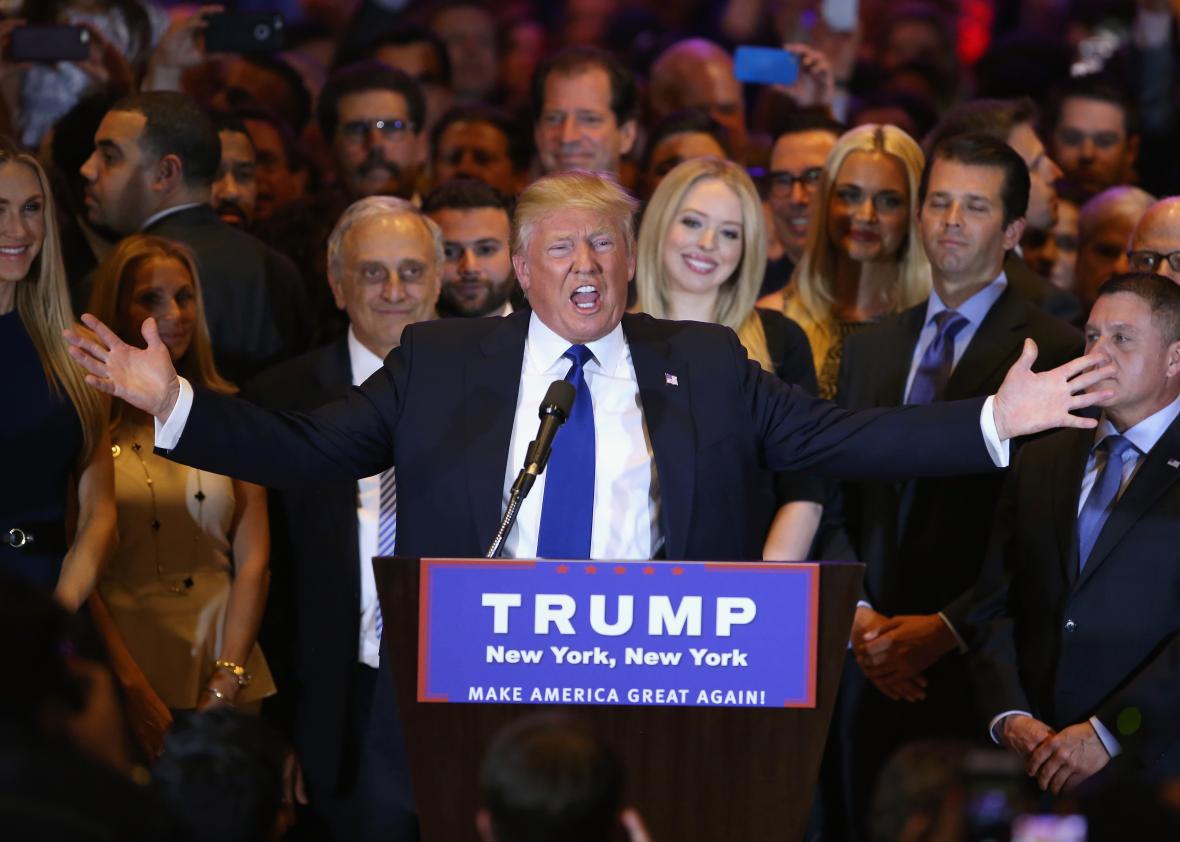Donald Trump has made a show of late of rebooting his campaign as a more traditional affair. He recently shook up his staff with an eye on the delegate wrangling that could decide the nomination. He dispatched aides to the U.S. Capitol to make inroads with Republican lawmakers. He’s promising a major foreign policy speech in Washington next week, which will involve a teleprompter and a speechwriter. He is now spending big on paid advertising. And he even started—though quickly stopped—referring to his rivals with their governmental honorifics instead of the juvenile nicknames he crafted for them.
“The campaign is evolving and transitioning, and so am I,” Trump boasted to the Wall Street Journal on Wednesday, promising to be “more effective and more disciplined” on the trail. “I’m not going to blow it,” he added.
My colleague Isaac Chotiner has already rained on the media’s new-and-improved-Trump parade, pointing out that the chattering class has fallen all over themselves to domesticate an American fascist in the name of crafting a compelling narrative (and trying to look smart on TV). The GOP front-runner’s much-discussed new posture, meanwhile, had already disappeared by Wednesday night, when he stepped on stage at an Indiana rally and performed his greatest hits.
Still, by feigning in the direction of the traditional with a few more moderate sound bites or the promise of a more effective ground game—actions his supporters can live with in the name of the almighty victory—Trump has created cover for himself to embrace other insider practices that he’s spent the past year specifically railing against. Consider this new report from Politico about the growing ranks of lobbyists that Trump’s new convention manager Paul Manafort has brought onboard:
Among the influence industry veterans who have been helping the campaign in recent weeks, according to sources close to the Trump campaign, are Laurance Gay, who had worked with Manafort on an effort to obtain a federal grant that one congressman called a “very smelly, sleazy business,” and Doug Davenport, whose firm’s lobbying for an oppressive Southeast Asian regime became a liability for John McCain’s 2008 presidential campaign.
The pair join another former Manafort lobbying partner named Rick Gates, who was identified as an agent of a Ukrainian oligarch in a 2011 racketeering lawsuit that also named Manafort. And Manafort this week met with Marc Palazzo, a former lobbyist for a Koch Industries subsidiary who used to work as a communications staffer for GTECH Corporation, the controversial lottery operator, to which Gay, Davenport, Gates and Manafort all have ties.
The fact that Trump’s associating himself with questionable characters is hardly a surprise at this point—but this is the same man who declared proudly early in his campaign: “I don’t want lobbyists. I don’t want special interests.” Trump’s dealings with those in the profession he professes to hate haven’t been limited to these men moonlighting on his campaign, either. The New York Times reported earlier this month that Trump met in secret with “nearly a dozen industry leaders, including a veteran lobbyist and the chief executive of a major airline trade organization.”
Trump’s anti-lobbyist stance isn’t the only portion of his carefully crafted outsider image that he’s abandoned of late. His recent financial filings, for example, make it clear that he’s not quite the self-funded candidate he claims to be. While he has loaned or given his campaign a total of $36 million, he has also raised more than $12 million from supporters. And, as the Washington Post points out, those are hardly unsolicited donations: His campaign spent nearly $900,000 on telemarketing and direct mail last month alone.
None of this is actually outlandish in the context of an election—raising money and relying on lobbyists is standard operating procedure for most candidates—but these are two things that Trump specifically said he’d never do as a way to sell himself as the only true outsider in the GOP race. The next time you hear him talking about his political “evolution,” then, remember what that means: He’s not promising to act more like a president, only more like a politician.
